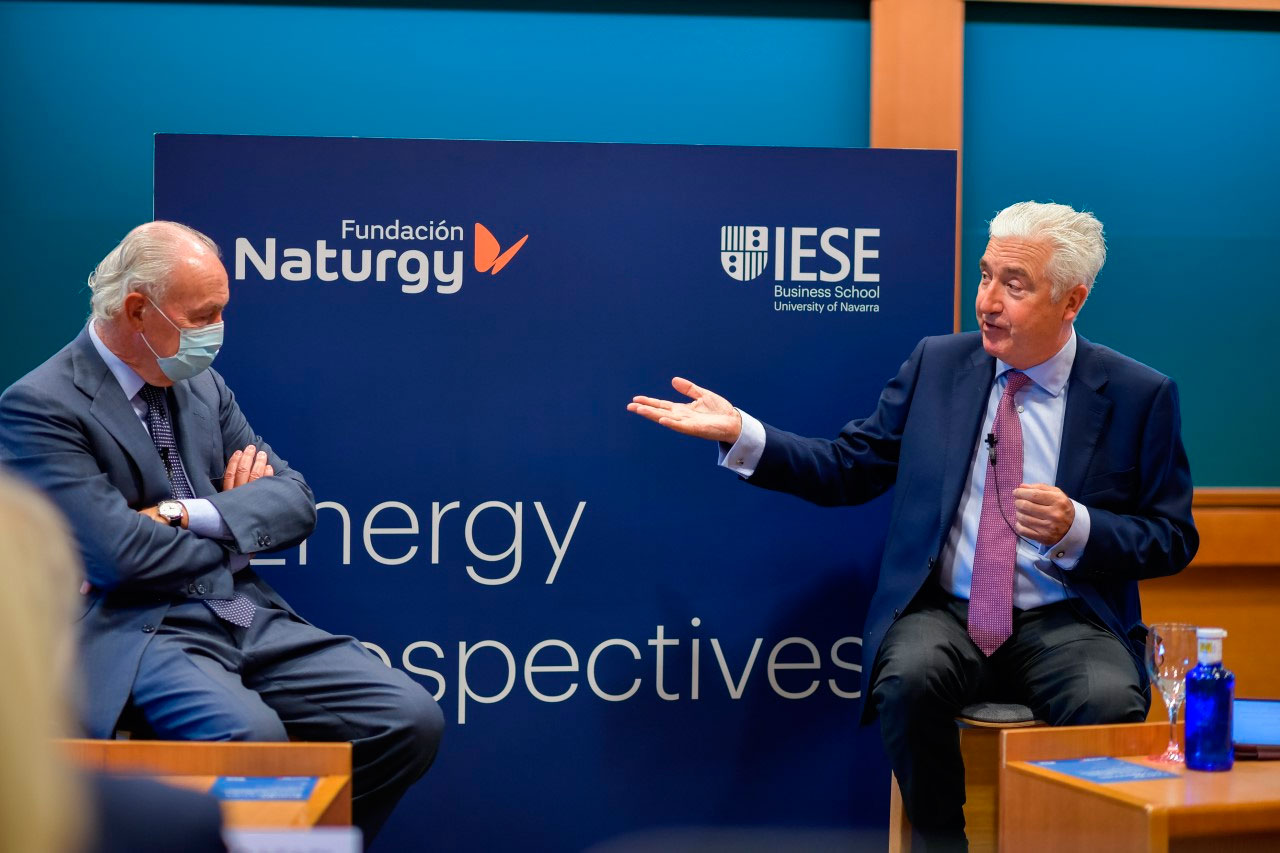Cristina Lobillo (EC): “The elimination of fossil fuels will improve the EU’s geostrategic position”.
The European Commission’s Director of Energy Policy and the former Secretary of State for Energy, Nemesio Fernández-Cuesta, today took part in the 7th session of the Energy Prospectives debates, organised by the Naturgy Foundation and the IESE Business School.

The European Commission’s Director of Energy Policy, Cristina Lobillo, and Spain’s former Secretary of State for Energy, Nemesio Fernández-Cuesta, today took part in the 7th edition of the Energy Prospectives conference cycle, organised by the Naturgy Foundation and the IESE Business School. This year's event was inaugurated by the President of the Naturgy Foundation, Rafael Villaseca, and the Managing Director of IESE in Madrid, José Luis Suárez.
Lobillo explained that the EC is finalising a legislative package for July that includes an overhaul of the Renewables and Energy Efficiency Directives. These provide for a “very ambitious” increase in the 2030 targets to meet the new goal for greenhouse gas emission reductions, which the EU has raised to 55% by the end of this decade.
“The EU has always maintained its role as leader in the fight against climate change, and phasing out fossil fuels will now enhance its geostrategic position”, said Lobillo, adding that “last year, we imported 87% of petroleum and 74% of gas”.
The EC’s Director of Energy Policy explained that the proposal is to expand the renewables target for 2030 from 32% to 38-40%. “The measures announced by member states put us at around 33%, so we believe that reaching 40% is feasible by implementing new renewable technologies”.
In that regard, she underscored the development of hydrogen, for which the EC will draft a legislative proposal in November. This proposal will include a system of hydrogen guarantees and certifications.
The public sector in the efficiency directive
Lobillo also mentioned the overhaul of the Efficiency Directive, which is part of the new legislative package. The proposal is to raise efficiency from 32% to 36-37% in final consumption and from 39%-41% in primary energy source. “These are ambitious targets, because after analysing the 27 NECPs [Integrated National Energy and Climate Plans], if all member states were to implement all the planned measures, 29% would be reached”, she explained.
“To achieve this, we are considering proposing a binding target and national indicative targets, which do not exist at present”, as well as including the public sector in the overhaul of the directive. “Around 75% of buildings in the EU are inefficient, and public buildings account for 30% of consumption”, she added.
The EC will also focus more on the consumer through digitalisation, which will be fundamental in the overhaul of the energy efficiency directive, Lobillo explained.
These measures are part of the 12 proposals in the legislative package being finalised by the EC to reduce greenhouse gases by 55% by 2030. “We have worked to make this legislative package cost efficient, because the energy transition will be very costly”, said Lobillo.
As regards the Next Generation funds, the European Director of Energy Policy said that “they are a unique opportunity to accelerate the energy transition”. “Accessing this budget will allow us to push innovative projects, and we hope it will also serve to attract private investment,” she added.
Creating a renewable gas market
The former Secretary of State for Energy, Nemesio Fernández-Cuesta, underscored three key aspects of energy policy: industry requires a “micro analysis” to transform its energy sources; transport must undergo electrification, placing special emphasis on developing a public charging network; and renewable gases will play a fundamental role in reducing emissions.
“Considering that, in the next 30 years, Spanish industry must replace 60% of its energy procurement” and that "two thirds of the energy to be replaced is natural gas", renewable gases are an option for tackling the energy transition. In this sense, he affirmed that “hydrogen looks to be the most promising option, but there are two conditions: making electricity cheaper and creating a market”.
Fernández-Cuesta spoke about sustainable mobility. “The electrification of light transport requires initial monetary support, technological neutrality during the expected cost reduction process for batteries and electric cars, as well as massive investments in public charging devices”, he said, while asserting that there is no clear technological alternative for 56% of transport energy consumption. “Solutions will have to harness natural gas, second-generation biofuels, renewable gases, hydrogen and synthetic fuels”, he stated.
With regard to the cost of electricity, he put forward tenders, PPAs and futures markets, as well as electricity storage and improving the useful life of nuclear power plants, to help lower the price and make it affordable to develop renewable energies.
In opening the 7th session of Energy Prospectives, Rafael Villaseca stressed that “energy is a transcendental factor for economic and social development and a decisive factor in the fight against climate change”. He went on to stress that “regulation is necessary” in this context, hence the importance of sessions such as the one held today.
Share